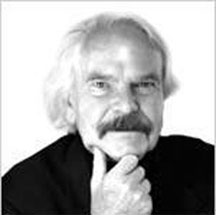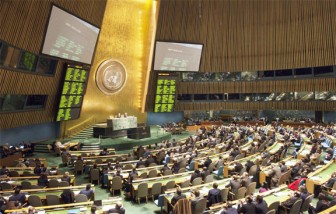By Bernd Debusmann
For decade after decade, diplomats at the United Nations have had on-again, off-again talks on how to reform the Security Council, the supreme decision-making panel on international security. The crisis in Syria shows that progress has been minimal and that power politics often trump human rights.
At issue is the composition of a body “frozen in amber since the end of World War II,” in the words of Stewart Patrick, a fellow at the Council on Foreign Relations, a New York-based foreign policy think tank. The biggest difficulty in unfreezing it is the veto power wielded by the five permanent members of the 15-nation council – the United States, Russia, China, Britain and France.

A veto by one permanent member is enough to sink a resolution. On February 4, two veto-wielders, Russia and China, banded together to vote against a resolution that provided for Syria’s president, Bashar al-Assad, to step aside, halt a ruthless crackdown on dissidents, and begin a transition to democracy. Assad saw the veto as a green light to crack down even harder. A week before the vetoes, the UN estimated the death toll at 5,400.
On February 28, it was revised to more than 7,500, the result of a merciless artillery and tank bombardment of the central city of Homs, an opposition stronghold. In the weeks between those body counts, there has been a growing chorus of condemnation of the Assad government, including a United Nations General Assembly vote (by 137 to 12) criticizing “widespread and systematic human rights violations by Syrian authorities.” Russia, China and 10 other countries voted against that resolution. It has no legal force, unlike council resolutions.

More international condemnation came from a “Friends of Syria” meeting that brought together Western and Arab foreign ministers whose calls for ending the violence and allowing access for humanitarian aid fell on deaf ears in Damascus.
Russia and China stayed away from the Tunis gathering and were showered with blistering criticism from US Secretary of State Hillary Clinton for their “despicable” Security Council vetoes.
Why the make-up of the council and the way it operates has remained unchanged since 1945 is a question that merits more vigorous public debate than there has been in the past. The case for re-thinking the system becomes stronger every time a veto frustrates the will of the majority. Clinton complained that the council had been “neutered” by the vetoes on Syria but the neutering is a logical consequence of the power wielded by the permanent five.
Never say never
They have the privilege to ignore the rest, push their own interests and protect their allies, as Russia did on Syria and as the United States (the most active veto-wielder in the past four decades) has done often to shield Israel from censure. None of the five have shown eagerness to change the veto system but that doesn’t mean it will never happen.
Ideas on what to change and how to do it have been tossed around since 1993 in the bureaucratic obscurity of the bureaucratically-named “Open ended Working Group to consider all aspects of the question of an increase in the membership of the Security Council and other matters related to the Council.”
An expansion of the top UN decision making body is more likely in the foreseeable future than “other matters”, a phrase that embraces abolishing the veto. In February, the four countries that have lobbied most energetically to become veto-wielding Security Council members (Germany, Japan, India, Brazil) issued a statement urging tangible progress before September, when the current session of the UN General Assembly ends.
Japan and Germany are the second and third-biggest financial contributors to the UN, India is a nuclear power and the world’s second-most populous country, and Brazil is becoming a regional superpower in Latin America. Their inclusion would be a big step towards a Security Council that reflects the world as it is now, not as it was in 1945.
Skeptics tend to argue that expansion of the council would result in a decision-making process even more difficult and time-consuming than it is now. Perhaps. But adding four stable, liberal democracies to the lineup would probably also result in better decisions.
(World Affairs columnist Bernd Debusmann has reported from close to 100 countries, on stories from the Soviet invasion of Czechoslovakia and the seizure of American hostages in Iran to Lebanon’s descent into anarchy and the withdrawal of Soviet forces from Afghanistan. Debusmann was shot twice in the course of his work — once covering a night battle in the centre of Beirut and once in an assassination attempt prompted by his reporting. Any opinions expressed here are the author’s own.)





